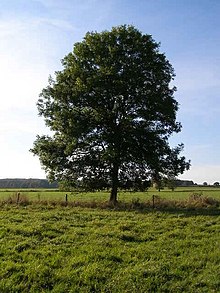آغاج
Appearance
Azerbaijani
[edit]Noun
[edit]آغاج (ağac) (definite accusative آغاجێ (ağacı), plural آغاجلار (ağaclar))
Declension
[edit]Declension of آغاج
Ottoman Turkish
[edit]
Alternative forms
[edit]- աղաճ (ağac) — Armeno-Turkish
Etymology
[edit]Inherited from Proto-Turkic *ïgač (“tree”); cognate with Old Turkic 𐰃𐰍𐰲 (iǧč /ïɣač/), Azerbaijani ağac, Bashkir ағас (ağas), Chuvash йывӑҫ (jyvăś), Kazakh ағаш (ağaş), Kyrgyz жыгач (jıgac), Turkmen agaç, Uyghur ياخاچ (yaxach) and Uzbek yogʻoch. The final consonant is unvoiced in the nominative in most cognates, becoming voiced in Ottoman Turkish, but reverting to unvoiced in modern Turkish and in some forms of Azerbaijani.
Pronunciation
[edit]Noun
[edit]آغاج • (ağac)
- (botany) tree, a perennial woody plant larger than a shrub
- wood, the substance making up the trunk and branches of a tree
- cane, walking stick, staff, a rod-shaped device for walking
- Synonym: دگنك (değenek)
Usage notes
[edit]- In compounds, as آغاجی (ağacı), forms names of trees from names of fruits borne by the trees.
Derived terms
[edit]- آغاج شقایغی (ağac şakayığı, “poppy anemone”)
- آغاج قاقان (ağac kakan, “woodpecker”)
- آغاج قاونی (ağac kavunu, “citron”)
- آغاج قرهسی (ağac karası, “dark gum oozing from some trees”)
- آغاج قوردی (ağac kurdu, “woodworm”)
- آغاج لالهسی (ağac lalası, “tulip tree”)
- آغاج چیلكی (ağac çileği, “raspberry”)
- آغاجلق (ağaclık, “full of trees”)
- آغاجلو (ağaclı, “having trees”)
- آغاجچق (ağacçık, “small tree”)
- آق آغاج (ak ağac, “birch”)
- آقچه آغاج (akça ağac, “maple”)
- اشكنجه آغاجی (işkence ağacı, “equuleus, Spanish donkey”)
- اغو آغاجی (ağu ağacı, “oleander”)
- انجیر آغاجی (incir ağacı, “fig tree”)
- تسبیح آغاجی (tesbih ağacı, “bead tree”)
- دار آغاجی (dar ağacı, “gallows”)
- دده آغاچ (dede ağaç, “Alexandroupoli”)
- ساقز آغاجی (sakız ağacı, “mastic, lentisk”)
- شمسیه آغاجی (şemsiye ağacı, “pagoda tree”)
- صبان آغاجی (saban ağacı, “wooden beam of a plough”)
- قره آغاج (kara ağac, “elm”)
- قزل آغاج (kızıl ağaç, “alder”)
- قطران آغاجی (katran ağacı, “terebinth”)
- پیغامبر آغاجی (peygamber ağacı, “lignum vitae”)
Adjective
[edit]آغاج • (ağac)
Descendants
[edit]Further reading
[edit]- Çağbayır, Yaşar (2007) “ağaç”, in Ötüken Türkçe Sözlük (in Turkish), volume 1, Istanbul: Ötüken Neşriyat, page 132
- Hindoglu, Artin (1838) “آغاج”, in Hazine-i lûgat ou dictionnaire abrégé turc-français[1], Vienna: F. Beck, page 48b
- Kélékian, Diran (1911) “آغاج”, in Dictionnaire turc-français[2], Constantinople: Mihran, page 22
- Meninski, Franciszek à Mesgnien (1687) “Arbor”, in Complementum thesauri linguarum orientalium, seu onomasticum latino-turcico-arabico-persicum, simul idem index verborum lexici turcico-arabico-persici, quod latinâ, germanicâ, aliarumque linguarum adjectâ nomenclatione nuper in lucem editum[3], Vienna, column 78
- Meninski, Franciszek à Mesgnien (1680) “آغاج”, in Thesaurus linguarum orientalium, Turcicae, Arabicae, Persicae, praecipuas earum opes à Turcis peculiariter usurpatas continens, nimirum Lexicon Turkico-Arabico-Persicum[4], Vienna, column 295
- Nişanyan, Sevan (2002–) “ağaç”, in Nişanyan Sözlük
- Redhouse, James W. (1890) “آغاج”, in A Turkish and English Lexicon[5], Constantinople: A. H. Boyajian, page 146
